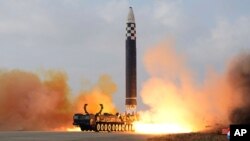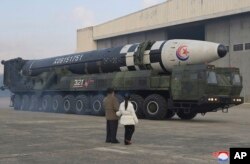The United Nations' Security Council needs to take "significant measures" in response to the latest intercontinental ballistic missile launch by North Korea, foreign ministers of the Group of Seven (G-7) major industrialized nations said Sunday.
The Security Council is set to discuss North Korea in a meeting Monday at the request of the United States, following the latest in a series of missile test launches this year.
"[North Korea's] actions demand a united and robust response by the international community," the ministers of the United States, Japan, Canada, Germany, Britain, France and Italy said.
U.N. Secretary-General Antonio Guterres also strong condemned the launch Friday and called on the North “to immediately desist from taking any further provocative actions.” His statement came after the United States and other countries issued their criticism.
In response, North Korea’s foreign minister called Guterres a “puppet of United States.”
"Recently I have often taken the U.N. secretary-general for a member of the U.S. White House or its State Department," Foreign Minister Choe Son Hui said in a statement Monday carried by state media defending the nuclear-armed North's right to develop weapons for self-defense.
“I express my strong regret over the fact that the U.N. secretary-general has taken a very deplorable attitude, oblivious of the purpose and principles of the U.N. Charter and its proper mission which is to maintain impartiality, objectivity and equity in all matters.”
Pyongyang tested on Friday a ballistic missile capable of reaching the U.S. mainland shortly after warning of "fiercer military responses" to Washington beefing up its security presence in the region.
The G-7 statement said Friday's test was a "reckless act" and "another blatant violation" of U.N. resolutions.
"The unprecedented series of unlawful ballistic missile launches conducted by (North Korea) in 2022 ... pose a serious threat to regional and international peace and security," the G-7 statement said, adding that the country "cannot and will never have the status of a nuclear-weapon state."






